
Balancing multiple jobs while studying in college and completing three degrees taught me the value of having the best morning routines for productivity. At the time, slow starts and wasted time weren’t an option.
If I wanted to stay on top of my workload and still have energy for the day ahead, I had to be intentional about how I started my mornings.
Through trial and error, I discovered that a structured morning routine wasn’t just a luxury for high achievers—it was a necessity for anyone managing multiple responsibilities.
The right habits in the first hour of the day made all the difference in how focused, productive, and in control I felt.
These habits carried over into my career, where I’ve never struggled to keep up with my work. And I want you to experience the same benefits.
So in this post, I’ll share practical, time-tested strategies for a productive morning routine—ones that helped me stay on top of my game and can help you do the same. Let’s get started!
1. Consistent Wake Up Time
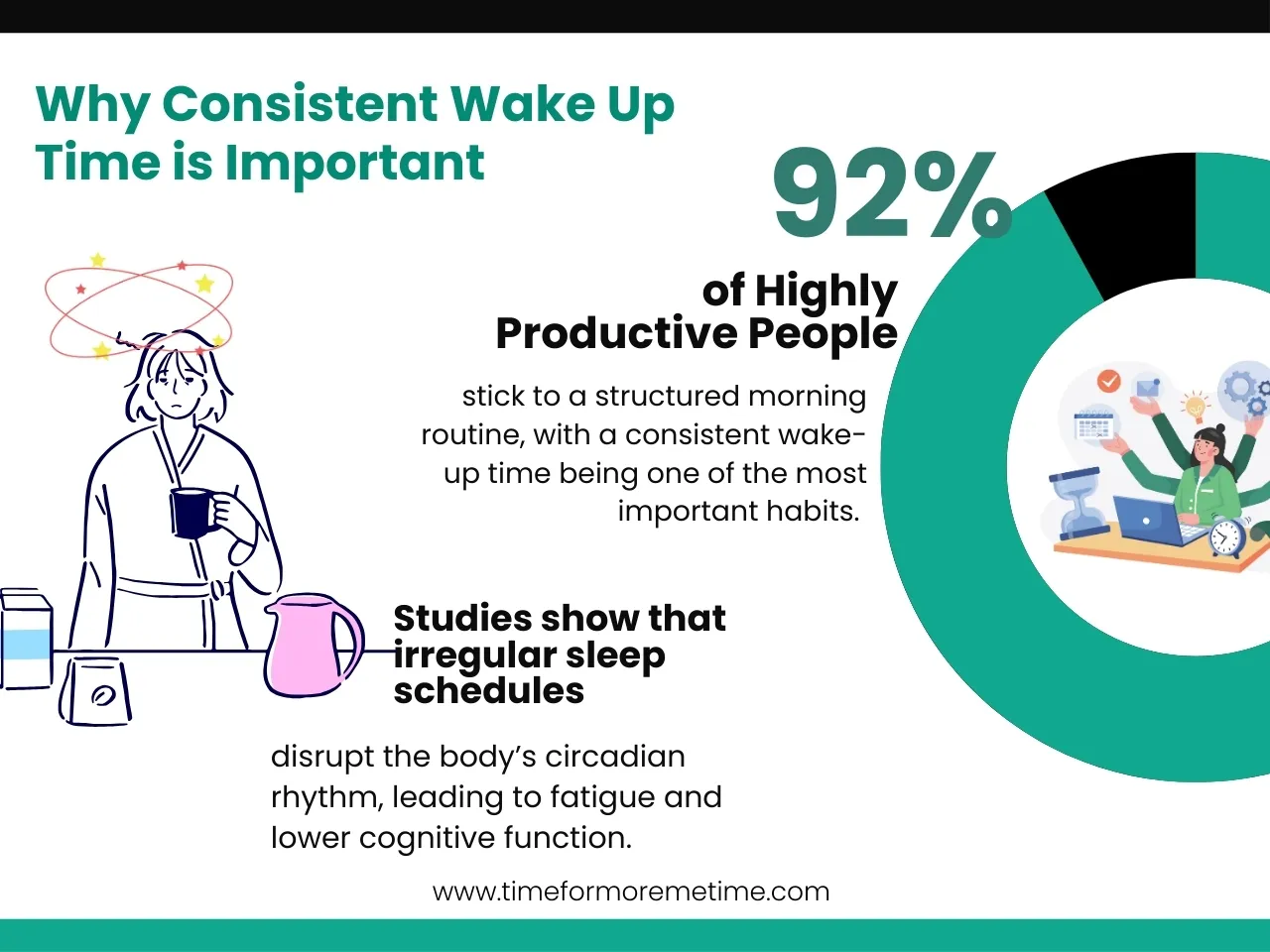
One of the biggest game-changers in my productivity was committing to a consistent wake-up time. Back in college, juggling multiple jobs while completing three programs meant I had no room for sluggish, unfocused mornings.
I noticed that when I woke up at random times—sometimes early, sometimes after hitting snooze multiple times—I felt constantly drained and behind schedule. But once I made it a habit to wake up at the same time every day, everything changed.
My energy levels stabilized, my focus improved, and I felt more in control of my time.
It turns out there’s science behind this. Studies show that irregular sleep schedules disrupt the body’s circadian rhythm, leading to fatigue and lower cognitive function.
No wonder 92% of highly productive people stick to a structured morning routine, with a consistent wake-up time being one of the most important habits. Once I locked in my wake-up time, my mornings felt more predictable and productive rather than rushed and chaotic.
Making the switch wasn’t easy at first, but here’s what helped me get into a steady morning rhythm:
- I adjusted my wake-up time gradually: Instead of forcing myself to wake up two hours earlier every night—which never worked—I shifted my alarm to 15 minutes earlier every few days until my body adjusted.
- I used natural light exposure: I noticed I felt more alert in the mornings when I stepped outside first thing in the morning. If natural sunlight wasn’t an option, I used a wake-up light alarm to simulate sunrise, which made waking up feel less like a shock to my system.
- I stopped scrolling my phone before bed: Once I realized that screen time was wrecking my sleep, I started putting my phone across the room an hour before bed. Research confirms that blue light suppresses melatonin, making it harder to fall asleep and wake up feeling rested.
Now, waking up at the same time every day is second nature to me. I no longer feel like I’m dragging myself through the morning—I feel ready to take on the day with energy and focus.
2. Aversion To Checking Phone
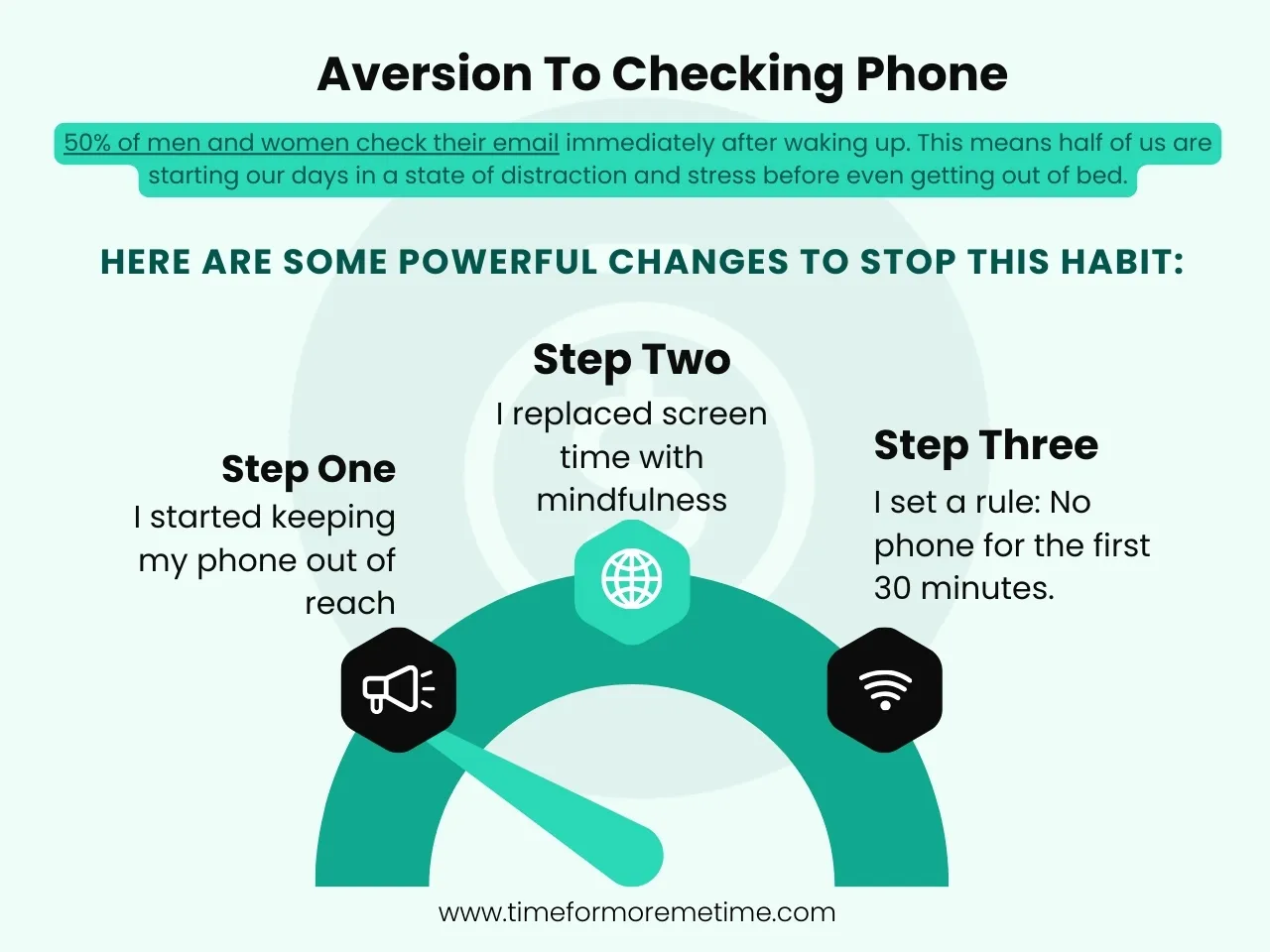
Back in the days, I developed a bad habit—checking my phone the moment I woke up. I’d grab it before even getting out of bed, scrolling through emails, social media, and news.
Before I knew it, my mind was already in reactive mode, worrying about things I had no control over.
Instead of starting my day with clarity, I’d feel scattered and overwhelmed. And I’m not alone—50% of men and women check their email immediately after waking up.
This means half of us are starting our days in a state of distraction and stress before even getting out of bed.
Once I realized how much this habit was draining my focus, I made some simple but powerful changes to my morning routine:
- I started keeping my phone out of reach: Charging my phone across the room forced me to get out of bed before I could check notifications, making it easier to avoid mindless scrolling.
- I replaced screen time with mindfulness: Instead of grabbing my phone first thing, I spent my first few minutes stretching, journaling, or just sitting in silence with my thoughts. It made my mornings feel more calm and intentional.
- I set a rule: No phone for the first 30 minutes: This gave me time to wake up, hydrate, and put my priorities before letting emails and social media dictate my mindset.
Once I broke free from the cycle of waking up and diving straight into digital distractions, my mornings felt more productive, focused, and stress-free. Now, instead of starting my day reacting, I start my day in control.
3. Optimal Rehydration
One of the best morning routines for success, practiced by many high achievers, is hydrating and fueling the body properly.
After college, when I was scraping by any means, I often skipped breakfast or relied solely on caffeine—only to crash a few hours later. But once I prioritized morning hydration and nutrient-dense meals, my focus and energy improved dramatically.
Hydration first thing in the morning is essential after hours of sleep. Drinking a full glass of water upon waking helps rehydrate the body, improves brain function, and kickstarts metabolism.
For optimal energy, I rotate between:
- Warm lemon water: Boosts digestion and hydration.
- Black coffee: Enhances focus when consumed in moderation.
- Protein smoothies: A nutrient-packed option that keeps me full.
Breakfast also matters. Oatmeal with nuts, Greek yogurt with honey, or avocado toast with eggs provides sustained energy. This simple morning routine to boost productivity made my day more productive, keeping me focused and alert—just like the routines of the world’s top performers.
4. Efficient Environment
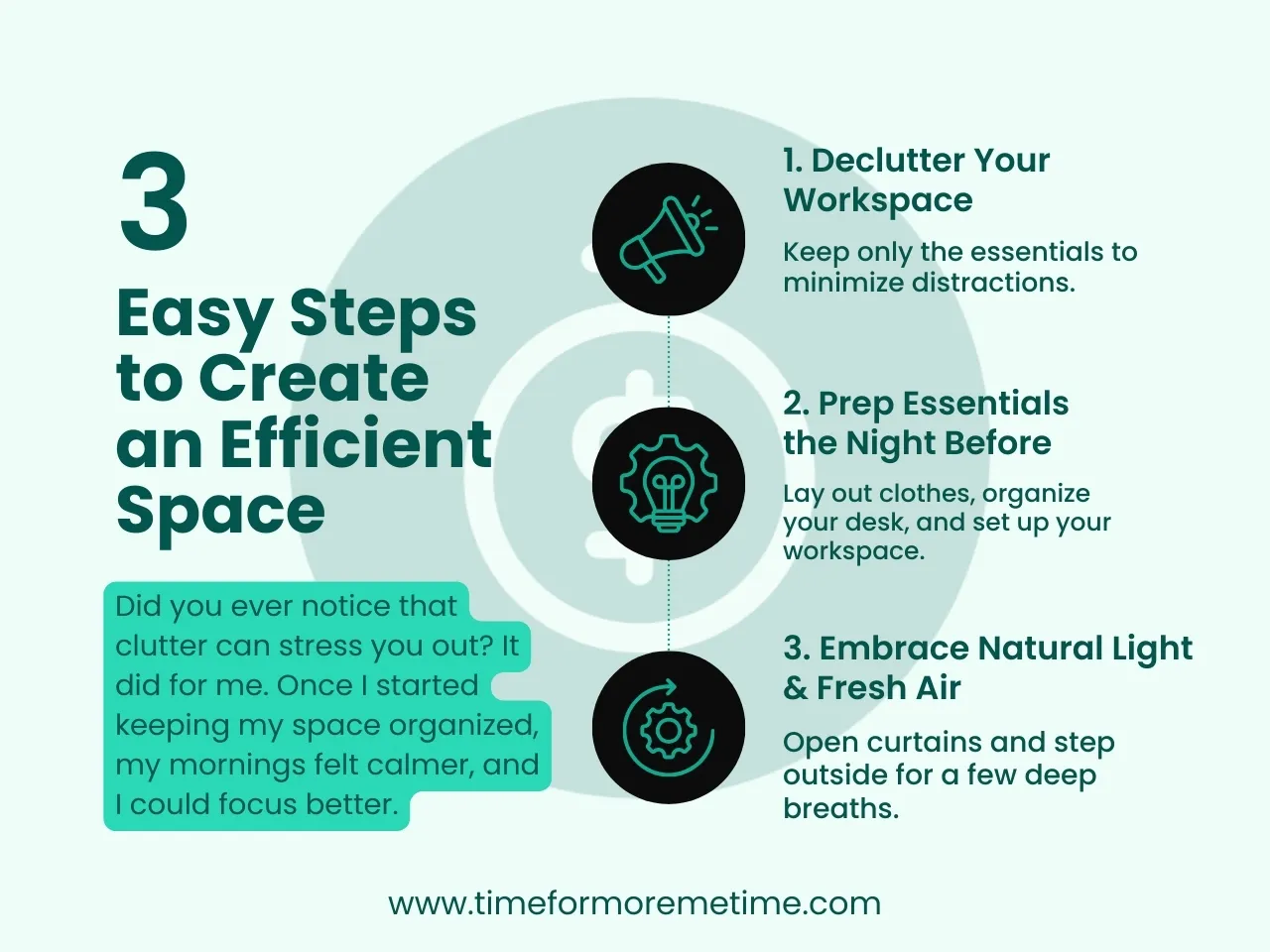
A simple way to boost morning productivity is by creating an environment that supports efficiency. As soon as you wake up, prioritize organizing the space where you’ll be working to make it conducive to focus and productivity.
Did you ever notice that clutter can stress you out? It did for me. Once I started keeping my space organized, my mornings felt calmer, and I was able to focus on important tasks without distractions.
A clutter-free environment leads to better concentration. I made it a habit to prep my essentials the night before—laying out my clothes, setting up my workspace, and keeping my desk tidy.
Research shows that organized spaces reduce mental fatigue, helping you stay productive.
To start optimizing your environment, having a natural light and fresh air also plays a big role in setting the tone for the day. Morning sunlight helps regulate circadian rhythms, leading to better sleep and higher alertness.
That’s why I started opening my curtains first thing in the morning and stepping outside for a few deep breaths. Doing this morning routine can instantly make me feel more awake and focused.
By decluttering, prepping ahead, and embracing natural elements, I created an environment that set me up for success every single morning.
5. Reliable Wind-Down Routine
Did you know that nighttime habits directly influence morning productivity?
Late-night screen time and irregular sleep patterns often led to sluggish, unproductive mornings. To combat this, I established a consistent evening routine that set the stage for success the following day:
- Avoid screens before bed: As I said a while ago, the blue light emitted by screens can disrupt melatonin production, affecting sleep quality. I made it a habit to turn off electronic devices at least an hour before bedtime, opting instead for reading or light stretching.
- Plan the next day: Writing a to-do list for the upcoming day helped clear my mind, reducing anxiety and mental clutter. This practice provided a clear roadmap for the day ahead, enhancing focus and efficiency.
- Establish a relaxing bedtime routine: Engaging in calming activities such as meditation or gentle yoga signaled my body that it was time to wind down, facilitating a smoother transition to restful sleep.
By implementing these nighttime routines, I transformed my mornings from chaotic to composed. The result? I saw an improvement in my productivity and overall well-being.
6. Motivational Content Consumption
Listening to uplifting audio content is one of the top ways to simplify morning routines. It stimulates the mind, offering fresh perspectives and energizing ideas. This practice boosts mental health, reduces stress, and improves focus.
Regular engagement with such content can also enhance active listening skills and provide valuable insights for personal growth. Here are some of the audio content I recommend:
- Motivational podcasts: Shows like The Tim Ferriss Show delve into the routines and habits of successful individuals, providing actionable advice for listeners.
- Self-improvement audiobooks: Titles such as Atomic Habits by James Clear offer strategies for building effective habits and improving productivity.
- Focus-enhancing music: Listening to classical music or curated playlists can create a calming atmosphere, aiding concentration and mental clarity.
So, if you want to approach your daily tasks with renewed enthusiasm, consider integrating these auditory elements into your morning routine.
7. Cold Showers
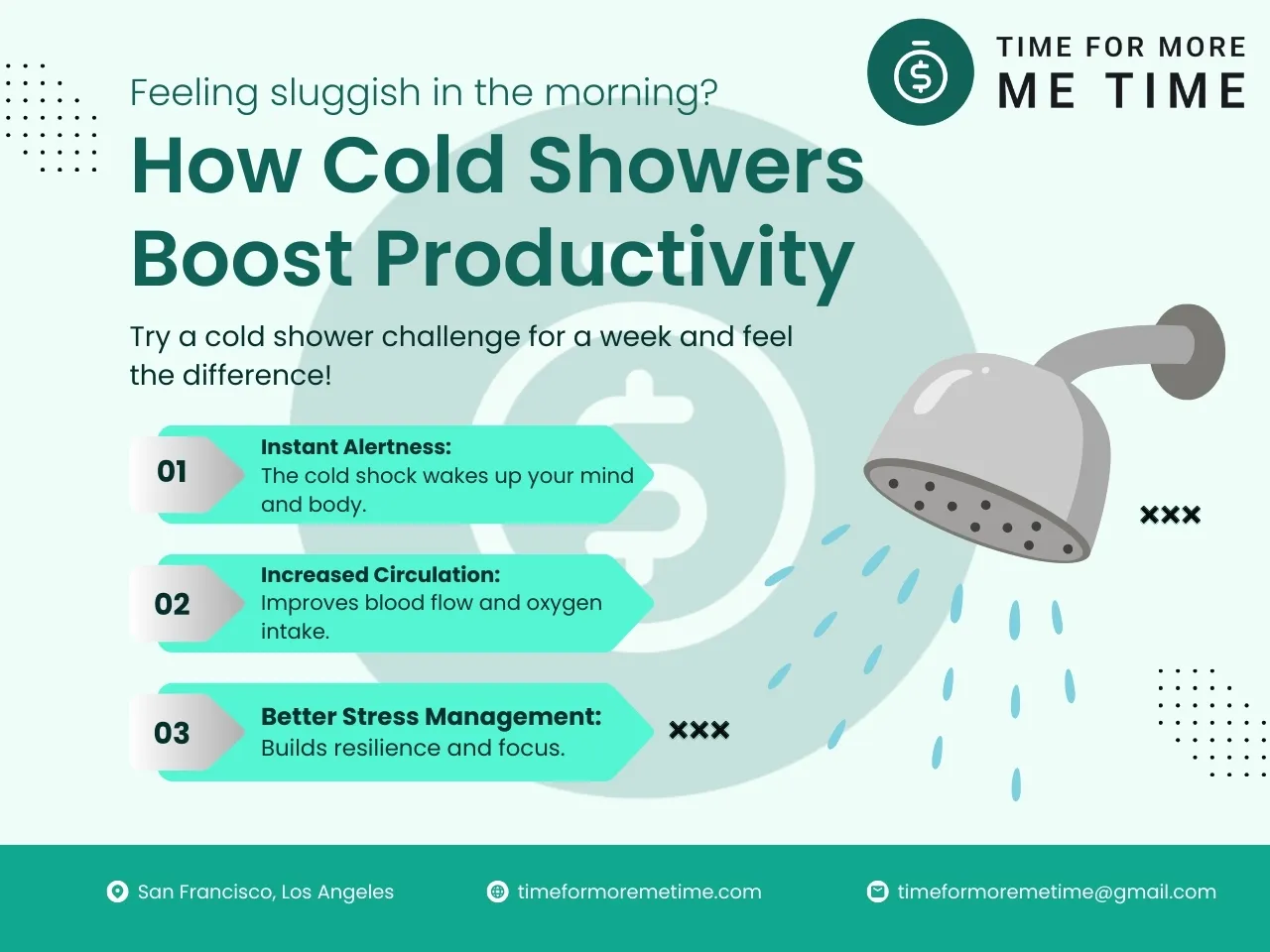
When I first heard about cold showers as a productivity hack, I thought, “No way am I doing that!” But there were some days before that I hit a point where I needed a natural energy boost that didn’t involve more coffee.
So, I decided to give cold showers a try—and while it wasn’t easy at first, the benefits were undeniable.
At first, stepping into freezing water felt like a shock, but within seconds, my mind was fully awake. The jolt of cold increased my alertness and left me feeling refreshed and energized.
Studies confirm that cold exposure improves circulation and increases oxygen intake, which explains why I felt more mentally sharp afterward. Over time, I noticed that cold showers also helped me manage stress better, making me feel more resilient and focused throughout the day.
To ease into it, I started with warm water and gradually turned it colder at the end of my shower. Eventually, I built up to 30 seconds, then a full minute under cold water. Deep breathing was key—focusing on controlled breaths helped me relax.
Now, it’s a daily habit that gives me a natural wake-up call, keeping me sharp, alert, and ready to take on the day.
8. Distraction-Free First Hour
After a shower, I found that the first hour of my day—also known as power hour—was crucial for setting the tone.
Starting the day with focused, uninterrupted time allows for immersion in tasks that require deep concentration. This practice enhances productivity and fosters a sense of accomplishment early in the day.
By avoiding reactionary tasks like emails and social media, I maintained control over my priorities rather than being swayed by external demands. And here’s how I did that:
- Utilize focus-enhancing apps: Time management tools can block access to distracting websites and applications across all devices, ensuring a seamless, distraction-free environment.
- Silence notifications: Keeping notifications turned off during this initial work period prevents interruptions that can break concentration and disrupt workflow.
- Employ noise-canceling headphones: Using noise-canceling headphones helps create a quiet workspace, minimizing auditory distractions and enhancing focus.
Dedicating the first hour of my day to focused work and minimizing potential distractions made me experience a significant boost in productivity. Besides, it helped me establish a more structured approach to managing my responsibilities.
9. Mindful And Grateful Mindset
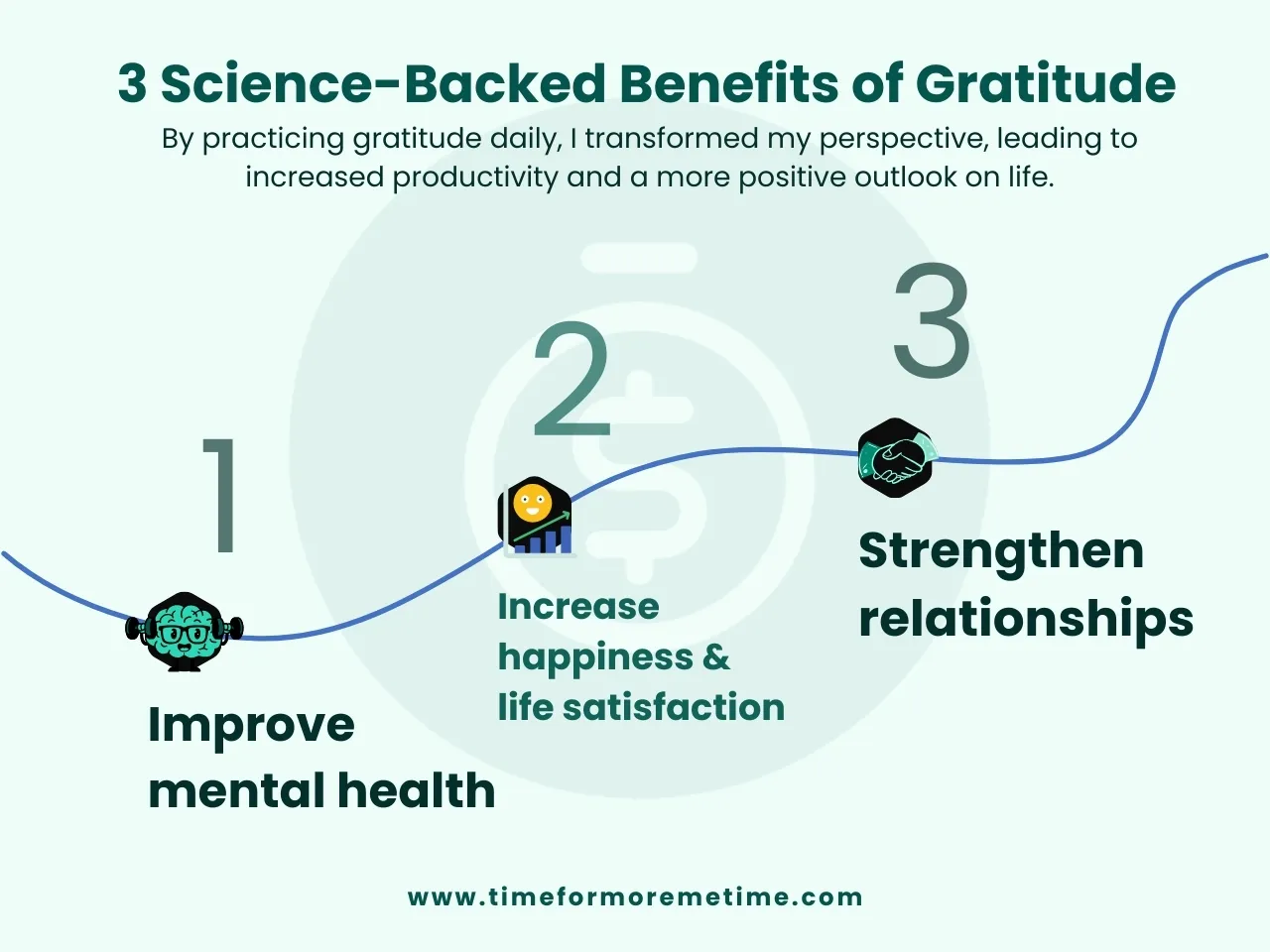
Embracing gratitude shifted my focus from challenges to positive aspects of my life, fostering a more optimistic mindset. This practice not only reduced stress but also enhanced my motivation and resilience.
Research indicates that gratitude can improve mental health, increase happiness, and strengthen relationships. If you’re ready, you may consider doing the following ways to practice gratitude:
- Journaling: Each morning, I wrote down three things I was grateful for, which set a positive tone for the day. This practice has been linked to increased happiness and life satisfaction.
- Expressing appreciation: I made it a point to thank someone daily, whether through a message or in person. This not only uplifted my spirits but also strengthened my relationships.
- Reflecting on achievements: At day’s end, I acknowledged a small win, reinforcing a sense of progress and accomplishment.
These simple gratitude exercises in my daily routine transformed my perspective, leading to increased productivity and a more positive outlook on life. What a simple way to start my day!
FAQs
I hope my morning routine strategies help you create a system that works for you! If you have any questions, this FAQ section should clear things up.
How long should an ideal morning routine take?
It depends on your schedule, but most productive people keep their morning routines between 30 minutes and 2 hours. The key is efficiency—prioritize high-impact habits that set the tone for the day without overwhelming your schedule.
What if I’m not a morning person? Can I still benefit from a structured routine?
Absolutely! A structured morning routine isn’t about waking up at dawn—it’s about starting your day with intention. Even if you wake up later, having a consistent sequence of habits (like hydrating, moving your body, and planning your day) can boost productivity and energy levels.
What if my schedule is unpredictable—how do I maintain consistency?
If your daily schedule varies, focus on core habits rather than specific timing. Anchor your routine around flexible actions—such as drinking water, stretching, or reviewing priorities—rather than a strict timeframe. This way, you maintain structure without feeling restricted.
Conclusion
Looking back, the biggest shifts in my productivity didn’t come from working harder—they came from starting my mornings with purpose. By adopting the best morning routines for success, I was able to focus better, manage stress, and stay energized throughout the day.
The key is consistency. Whether it’s waking up at the same time, avoiding your phone first thing, hydrating, or practicing gratitude, these habits work because they set the right foundation.
Even small changes—like prepping your space the night before or listening to motivational content—can have a huge impact. Successful people don’t leave their mornings to chance, and neither should you.
Now, it’s your turn. Pick one habit from this guide and start implementing it tomorrow morning. Then, gradually add more as they become second nature. Your future self will thank you—because when you master your mornings, you set yourself up for a more productive, focused, and fulfilling life.
And, of course, don’t forget to subscribe to both my email list and YouTube channel to stay updated when a new article or video is published!






